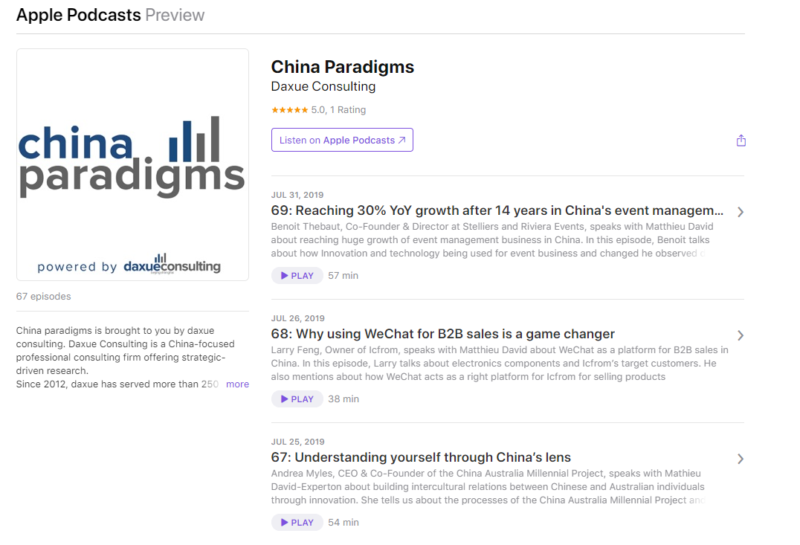A guide to B2B marketing in China
The vast and lucrative Chinese market offers a wide range of opportunities for B2B businesses. From 2012 to 2018, the transaction volume of B2B e-commerce in China increased from 6.25 trillionRMB to 22.5 trillion RMB. However, the Chinese market is complicated. The ongoing Eastern-Western cultural differences, together with language barriers, dissimilar business norms, and unique digital marketing platforms, make it challenging for foreign companies to be profitable in the B2B market in China. If you are a B2B marketer, how can you perfect your B2B marketing strategies and be successful in China? Daxue Consulting offers professional services to help foreign companies navigate these complexities and smooth the route to successful B2B marketing in China.
Buying or selling products for business in China? Understanding the B2B Market in China
Although traditional B2B marketing still plays an influential role in attracting clients and selling products in the B2B market in China, the digital B2B marketing strategies become more and more critical with racing digitalization in every aspect of life. 95% of B2B clients search the Internet for suppliers nowadays. Not surprisingly, the revenue of the B2B e-commerce in China boomed 275% from 16 million RMB in 2012 to 60 millionRMB in 2018.
Further, B2B e-commerce in China is dominated by several critical online platforms. In 2018, the leading players represented nearly 70% of the whole market share, of which Alibaba has the largest market share (28.40%).
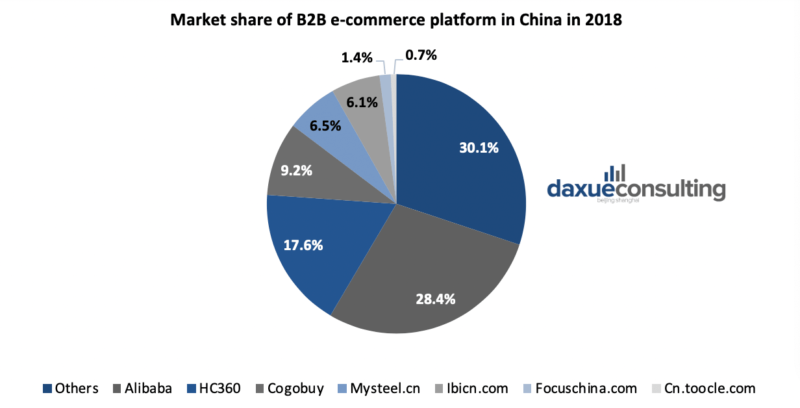
[Data source: Statista-Market share of B2B e-commerce platform in China in 2018]
The B2B businesses in China can be divided into two broad categories—trades in commodities (e.g., steels, chemical products, textiles, etc.) and intangible products (e.g., SaaS, logistics, legal service, etc.). Taking a further step, the B2B market in China has diverse market segments. Although different market segments are in various stages of development, one typical character is that no major players have formed a monopoly. The opportunities to enter into China’s B2B market are many.
Characteristics of B2B in China
There are five trends in China’s B2B market:
- Online small scale foreign trade recently has become a hot topic in China’s B2B market.
- B2B e-commerce value-added services of middle and small scale companies is currently rising.
- The profit of e-commerce service providers keep growing.
- B2B e-commerce facilitated the switch from the building of an information flow system to a fund flow system.
- The vertical structure of the online B2B market offers company a lot of potential for future growth.
Characteristics of B2B Clients in China
Domestic suppliers and B2B clients are accustomed to using digital platforms to build, convert, and maintain relationships. Overall B2B marketing strategies in China make B2B clients become digital savvies. They actively search for information online and make purchase decisions even without the help of sales representatives. Additionally, B2B clients in China look for similar online experiences that they encounter as consumers in a B2C condition. Specifically, the B2B clients expect to have optimized search engines, read ratings and reviews from other companies, have personalized products and differentiated customer experiences, and get a consistent experience across online and offline touchpoints.
Digitalization of the B2B market in China makes the information more transparent and accessible; however, B2B clients in China continuously regard strong and weak ties in social networks as vital resources for businesses. Therefore, B2B clients still believe in conventional ways to do business. Trade exhibitions, recommendations from well-known companies, and other ways to build offline connections are important to acquire clients in China..
Challenges foreign companies face in B2B Marketing in China
Lack of social connections is international companies’ one universal disadvantage. Traditional Chinese culture emphasizes the interdependence of social relationships. Businesses heavily rely on networks of trust and mutual obligations than on strong, codified laws. As a result, “Guanxi” has become an essential concept that foreign companies need to understand and adapt to. Unlike domestic suppliers who are deficient in human capital, international companies need to build social relationships and get the trust from domestic B2B clients in a short period.
Moreover, compared to domestic suppliers, international companies are failing to keep pace with the progressing B2B e-market in China. The lack of investment in digital channels contributes to B2B clients’ negative purchase experiences. The limited experiences with digital B2B marketing in China also increase the probability of failing to adapt promotions that fit with the fast-changing digital ecosystem. On the other hand, the domestic companies’ products and B2B e-marketing are maturing. To grab market share, B2B marketers in foreign companies must enhance the digital competitiveness to attract B2B clients in China and satisfy their needs.
Essential steps for B2B marketing in China
Search and Planning
The unique and dynamic environment of the B2B market in China deserves in-depth investigations before the foreign companies enter into the market. Investigations should also take Chinese culture into consideration.
One effective way is to cooperate with local marketing consulting teams and to seek advice from experts. A comprehensive understanding will help the companies to evaluate the risks involved with implementing a series of decision-based actions and select a proper market segmentation and targeted buyers.
Traditional B2B Marketing Strategies in China
Competitive offline distribution network still deserves companies’ attention and enough investment, primarily when B2B companies target specific regions and compete with local suppliers. An offline presence signifies companies’ long-term commitment to China and provides security to B2B clients. Consequently, traditional offline B2B marketing strategies in China, such as conferences and exhibitions, are favored by B2B clients in China. Participating in such events is an excellent way of making initial contact with customers. It is also a good mean of moving a potential social relationship with B2B clients forward relatively quickly.
Digital B2B Marketing Strategies in China
One key point that every company must know to achieve success in the B2B market in China is that e e-marketing in China is different from it is in the western world. Popular online sites like Facebook, YouTube, Twitter, and so on are banned in China. To enter the B2B market and reach B2B clients, companies should adopt widely-used social media platforms in China .
Chinese Official Website
A well-organized and professional-designed official website is a must. The official website is more than an online catalog. B2B clients use official websites as efficient tools to know B2B companies and companies’ products or services. Official websites play considerable roles in every single stage of the B2B clients’ journey. Therefore, clear and attractive official websites, also known as brand.com, are effective channels to generate interests from B2B clients, attaining sales leads, and partnership opportunities.
Two standards are crucial in website optimization. First, the website should be designed and tested in a mobile-friendly way. 99.1% of Chinese Internet users access the Internet with mobile devices. Building a website that is responsive to various electronic devices will help companies display information visually and win more customers. Second, the content of the website should be delivered in simplified Chinese. Chinese consumers get used to receiving persuasive information with high-quality content in Chinese. Adopting the local language will make it easy for customers to understand and trust the messages. It also shows companies’ respect and commitment to the Chinese market.
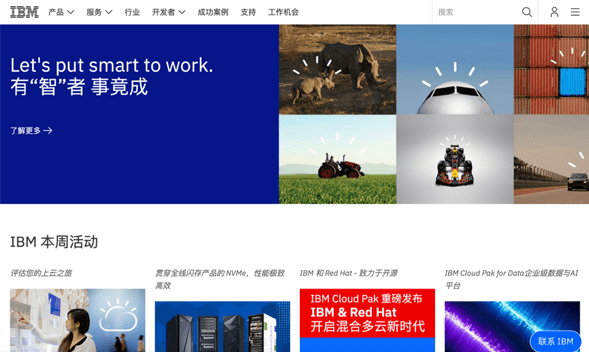
[An example of Chinese B2B Official Website Source: IBM]
Cooperating with B2B e-Commerce Platforms in China
It is expensive to create and maintain an official website, especially for small to medium-size enterprises. Collaborating with leading e-commerce platforms in China is smart, as B2B e-commerce in China is flourishing and the platforms are frequently used by B2B clients in China. Different from official websites, B2B e-commerce platforms in China aim at selling products and services directly to B2B clients.
Alibaba is the B2B e-commerce market leader with strong brand recognition. The company owns a platform for international businesses and a platform for domestic businesses. On the platforms, foreign suppliers can create a homepage to publish product information, while buyers use the search engine to find the needed products.
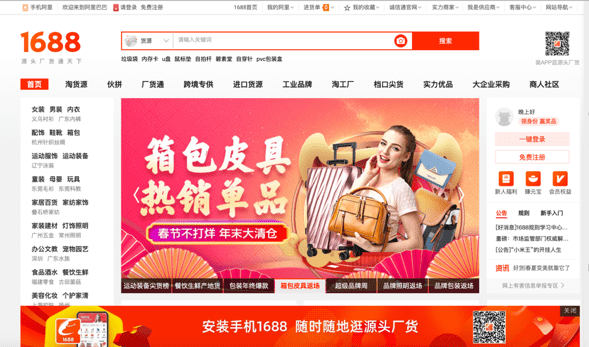
[Website of 1688.com Source: 1688.com]
Baidu’s Search Engine Marketing (SEM) Services
It is important to list the top in search engines. B2B clients are more likely to read top information and think the business of top websites are more authentic than the rest. Baidu is to China what Google is to the rest of the world. In 2019, Baidu had a market share of 61.3% of search engines in China. B2B clients in China frequently use Baidu to find suitable suppliers.
Baidu provides SEM services to let companies’ information become more accessible to potential B2B clients at the search or discovery stage. A Baidu’s pay per click (PPC) advertising campaign is a vital way to generate leads from China in a quick but short-term way. However, the quality of the PPC is not guaranteed. Baidu’s search engine optimization (SEO) is another way to optimize content for the target B2B clients. It has an excellent effect as a part of a long-term and sustained marketing approach.
Baidu’s SEM campaign will be especially beneficial when the companies have their own official websites. Even if the companies are not ready to spend money on Baidu’s SEM, they should at least apply for Baidu Webmaster Tools for the official website, which will keep track of the web pages that are being indexed.

[source: Official website of Baidu marketing]
WeChat is the primary way Chinese people keep in touch with contacts and exchange information. It has over 1.15 billion active users by the third quarter in 2019 and is popular in white-collar professionals, with 53.4% of WeChat users age between 25 to 35.
People use WeChat as a primary method in business. To communicate with B2B clients in China more effectively, foreign employees, especially sales representatives, in the companies need to have personal WeChat accounts. As the work-life boundaries in WeChat are blurred, employees in the B2B companies have opportunities to develop close relationships with the B2B clients, which may bring more human capital.
Creating companies’ WeChat official accounts is an easy and quick way to reach out to potential B2B clients and maintain relationships with current B2B clients at a lower cost. The official accounts allow for one-to-one personalized interaction between companies and B2B clients. That is, B2B clients can communicate with companies directly through the messaging functions; get customer services directly when needed. In addition, B2B clients might be interested in the insights of industries and B2B companies’ products and services. B2B companies can share their knowledge on the WeChat official account. The more professional and helpful content, the more (potential) B2B clients will follow the official accounts.
Official WeChat account for B2B
Similar to Official websites, WeChat official accounts are platforms for B2B clients to get information and updates of the companies instead of selling products to clients directly (although companies can have online stores on WeChat). Having and continually improving the WeChat official accounts is a must, especially when the companies do not have official websites.
WeChat advertising is a new trend. It allows companies to advertise on WeChat with banner ads, KOL advertisements, and Moments ads.
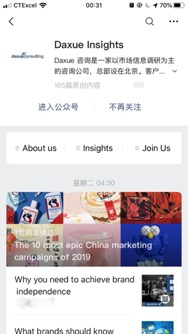
[Dauxe consulting’s WeChat official account source: Daxue Consulting]
With 216 million daily active users, Weibo is an appropriate social media platform in China for users to get information and explore topics. Weibo has a vibrant business community, B2B brands like Intel and Cisco included. Companies can create engaging content and host certain topics through hashtags by using their Weibo account. Weibo is a self-publishing tool for broadcasting to the public. B2B companies use Weibo to acquire more potential B2B clients, mainly those who are enthusiastic about sharing and social activities.
Furthermore, verifying the business accounts has multiple benefits for B2B companies. Once the account is verified, Weibo will classify the brand profile into relevant categories. The categorization will help B2B companies to get a connection with other related companies and the target groups of B2B clients. Weibo is especially useful when B2B companies have social elements in the marketing approach.

[An example of a verified business account in Weibo, source: Cisco]
Zhihu
Zhihu is a social question-and-answer website with a market share of 7.6% in 2016. One important fact to note is that Zhihu has tremendous trust rankings on search engines, such as Baidu. Marketing strategies such as creating discussions regarding companies, writing in-depth articles, and providing useful information to users on Zhihu can significantly improve the B2B companies’ presence on search engines.
Besides, Zhihu’s expertise and depth of topics overpower other social media platforms in China. It also has a friendly atmosphere, making the contents in Zhihu widely recognized and trusted. As a result, the information displayed on Zhihu is more influential when B2B clients are making decisions.
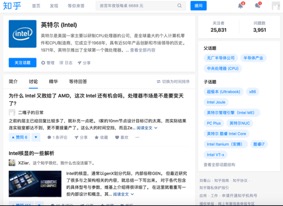
[An example of brand-related questions in Zhihu, source: Intel]
PR for B2B companies in China
PR agencies will help to increase the companies’ exposure and to build companies’ reputations. It is one of the most cost-effective methods. Companies can have an expert or a leader to talk about the products positively or cooperate with Chinese online news (e.g., Sina, Sohu, 163, etc.; online news portals should be chosen according to the field specialization). Daxue consulting can also perform a PR campaign evaluation in China to ensure your company is on the right track.
Other social media platforms in China
UGC, Douyin, Toutiao, and so on are other poplar social media platforms in China. In order to gain a competitive advantage in the B2B market in China, foreign companies need to select suitable e-marketing strategies according to their products and segmentations and follow the right marketing plans to deliver their message to the potential B2B clients they are looking for.
Business Analytics
To ensure the effectiveness of the marketing strategies, companies should track and evidence the marketing campaign progress in a timely and accurate way. The results will help B2B marketers to refine or re-target the e-marketing campaign if necessary and let B2B marketers relocate resources to the most effective marketing strategies to get the maximum return. Baidu Analytics (Baidu Tongji and Baidu Zhanzhang) are analytic tools to produce an insightful report and to help B2B marketers integrate useful marketing strategies and deliver personalized messages to target customers through multiple channels.

[Source: Baidu Tongji]
Do not make these B2B marketing mistakes in China
Neglecting of Local Culture and Business Etiquette
The competition is fierce in the B2B market in China. Neglecting of local culture and business etiquette will become particular obstacles to build up and maintain a good connection with B2B clients in China. Although it is difficult to change companies’ style or culture, it is important to show the openness and willingness to learn Chinese culture.
Therefore, employing local staff to assist B2B marketing in China is essential. Besides, the parent companies should understand the complexities of China’s environment and let their Chinese branches employ more flexible strategies to do business in China.
Being Professional is not Enough
Regardless of the industries, the products and services provided by foreign companies need to be tailored to fit with Chinese market requirements. International companies are often perceived as being professional. However, they are not flexible enough to customize their offers to solve a specific business problem. As a result, B2B clients in China only regard these foreign companies as mere suppliers but not as true partners or long-term solution providers. The failure of going beyond the sales makes against building “Guanxi” with B2B clients.
Targeting China as One Large, Unified Market
China is the third-largest country in the world, with 661 cities and 23 provinces. Elements such as economic status, culture, population, etc. are divergent across regions. Therefore, targeting the whole B2B market in China is not a wise decision. Foreign companies should start small, learn, and then adapt as necessary.
Email Marketing is not popular in China
Due to unique Internet-cultural developments, email has never been necessary for Chinese. People prefer to use instant messaging app even for business communication. In December, 2018, only 166 million devices used Email app; while more than 1.2 billion devices used instant message app. Predictably, email marketing in China can be a very frustrating process. With high probability, the B2B clients in China will not check emails and ignore the advertising.
But it is still necessary to have an official email address for business communication. One thing to keep in mind, Gmail is not accessible in China. To avoid complications, domestic email services, such as enterprise e-mailbox from Netease or Tencent, are highly recommended.
Work with a B2B Marketing Agency in China
Daxue Consulting is a professional market research company based in both Shanghai and Beijing. As an expert in conducting consumer research and marketing analytics, our team helps foreign companies with vital insight, knowledge, and expertise understand the complex business factors in the B2B market in China.
Our team is here for you to satisfy all your marketing, design, and development needs. We can help you develop integrated B2B marketing strategies and to achieve success in the B2B market in China.
Developing trends of China’s B2B industry
According to experienced professors and analysts, the future trend of B2B include: merging of vertical search engines and industry websites; putting equal stress on domestic trade and foreign trade; sharing of information from all industries’ websites and creating leagues; paying attention to practical application of the platform; the transition of B2B deals into small B2B deals; introducing the concept of SNS; getting more support from the government; introducing new things to the internet and strengthening the application of information technology.
Let China Paradigm have a positive impact on your business!
Listen to China Paradigm on iTunes
